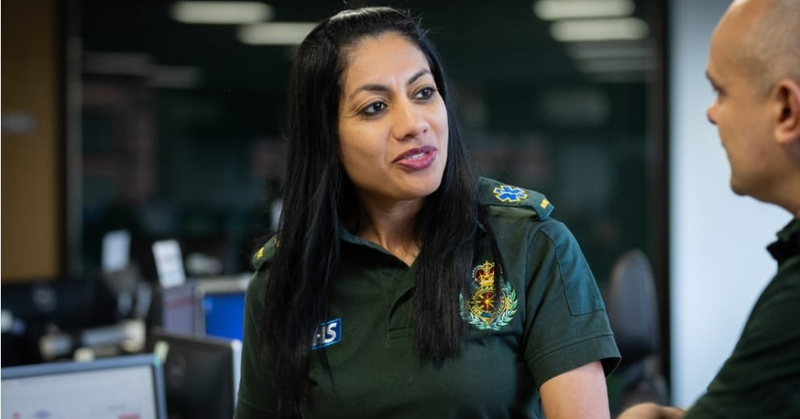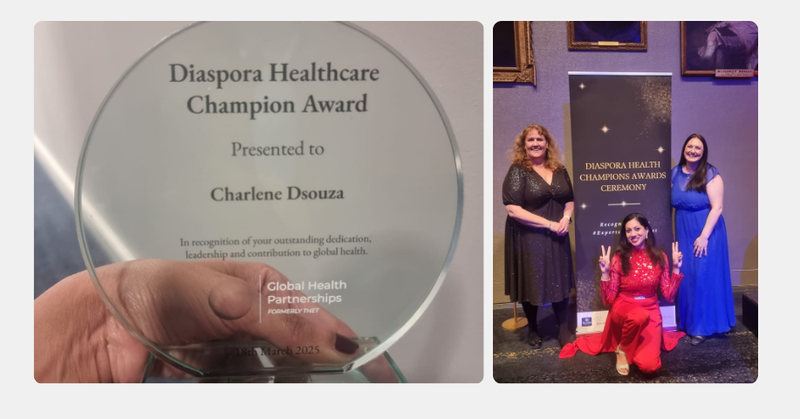
"Taking OET was the best decision I ever made.”
From Mangalore to Dubai to the UK, Charlene D’Souza’s career has spanned continents, emergency vehicles, and classrooms. But one thing remained consistent: her drive to grow. Today, she’s a Clinical Team Leader with the South Western Ambulance Service NHS Foundation Trust — and she says taking OET played an important role in helping her get there.
Charlene began her journey in 2004 with a Diploma in Nursing and Midwifery, later earning her B.Sc. in Nursing from Rajiv Gandhi University. After moving to Dubai in 2008, she joined the Dubai Corporation for Ambulance Services (DCAS), quickly rising through the ranks. What started as an EMT Basic role evolved into senior positions in life support education, where she trained paramedics, doctors, and nurses in critical emergency care.
Despite a successful 13-year career in the UAE, Charlene knew her journey wasn’t complete. “The salary and life in Dubai were good,” she said, “but there was no stability — no citizenship or long-term opportunity.” She turned her eyes to the UK, drawn by the promise of growth, security, and a chance to continue her work in a healthcare system that valued her experience.
Discovering OET — the test that made sense
Before landing her role in the NHS, Charlene faced an uphill battle with immigration requirements. “I tried to go to Canada. I spent 15, 000 to 20,000 dirhams on the process,” she recalled. “But it didn’t work — my teaching experience wasn’t considered patient-facing enough.” She also attempted the IELTS three times and fell short. “Every time I was just 0.5 marks away from the score I needed. It was frustrating.”
That’s when a friend suggested she try the OET Test.
“The minute I saw that OET Test was healthcare specific, I knew it was for me,” Charlene said. “It made sense. The language used in the test was the same language I used every day as a nurse. I wasn’t just proving my English; I was proving my ability to communicate as a healthcare professional.”
Charlene passed OET Test on her first attempt.
From hospital ward to ambulance services: rapid career growth in the NHS
Charlene's move to the UK became possible thanks to the Devon Alliance International Recruitment Team, who saw beyond the job titles on her CV and recognised the depth of her experience. “No one else would consider me because I had transitioned into teaching,” she explained. “But Devon Alliance thought differently. They said, ‘We would really be lucky to have you.’”
Charlene began her UK career in March 2022 as a Band 5 nurse at Royal Devon and Exeter Hospital, working in the dementia ward. “The transition from prehospital emergency care back into a hospital setting was tough,” she admitted. “But I knew my skills were still there. I just had to adapt.”
Her talent and commitment were quickly recognised. Within a year, she was promoted to Band 6 as an Acute Care of the Elderly Specialist Nurse. But her heart still belonged to the ambulance services.
That’s when she saw a position open up at South Western Ambulance Service NHS Foundation Trust (SWAST) for a Band 6 Triage Nurse Clinician. Charlene applied, but her CV was initially rejected. However, just like when they first brought her to the UK, the Devon Alliance once again stepped in to support her.
“They contacted SWAST and said, ‘You’re making a mistake — this is the right candidate.’ They believed in me when others didn’t,” Charlene explained. “Thanks to them, my application was reconsidered, and I got the interview.”
Charlene didn’t just pass the interview — she excelled. She joined SWAST in July 2023 and quickly made her mark. By April 2024, she had been promoted to Band 7 Senior Nurse Clinician. Six months later, she progressed to Lead Clinician, and by January 2025, she was appointed Clinical Team Leader.
“I’m truly grateful to the Devon Alliance,” she said. “Their support didn’t stop after recruitment. They’ve been there throughout my journey, checking in, helping, encouraging. If it wasn’t for them, I wouldn’t be where I am today.”
Leadership, recognition, and a vision for the future

In March 2025, Charlene was honoured with a Diaspora Healthcare Champion Award recognising her outstanding contributions to leadership and diaspora healthcare in the UK. Organised by Global Health Partnerships to celebrate Experts in our Midst, The Diaspora Health Champions Awards recognises and celebrates the expertise of international staff members in the NHS and UK independent sector.
“I’m grateful,” she said. “To the Devon Alliance for believing in me, and to the SWAST leadership for their trust. Without them, I wouldn’t be here.”
Now, she’s helping others, teaching first aid through the One Life Training Centre and mentoring nurses. “I want to contribute not only to patient care but also to the development of my colleagues. Education is my passion.”
Advice to future OET candidates and international nurses
Charlene is clear about the role OET played in her success.
“For those in the medical field, OET Test not only assesses your command of the English language but also evaluates one’s ability to communicate in a healthcare setting. Passing the OET Test can profoundly impact both your career and personal life, opening doors to new opportunities and facilitating professional growth.”
Her advice? “Don’t just rely on videos — prepare and practice. Practise every bit — reading, listening, writing, speaking. I did an OET preparation course because I knew I needed more structure. And it worked.”
If you’re planning to take OET, the right preparation makes all the difference. Like Charlene, you can boost your confidence by studying with experienced teachers who understand your profession.
Is this your first time hearing about the OET Test? Watch our helpful webinar series for a complete overview of the test and how it can help you achieve your healthcare career goals.
To nurses considering a move abroad, she offers this encouragement: “The first year can be tough. You’ll struggle. But once you adjust, the UK is full of opportunities. Here, your work is recognised, and you can grow.”
OET Tip: Overseas nurses can find a job in the UK by applying directly through job boards like NHS Jobs, or by using a recruitment agency — if you are looking to apply via a recruitment agency, make sure they follow ethical guidelines by checking the agency is on the NHS Employers ethical recruiters list. Remember, UK-based agencies can not charge fees for finding work.